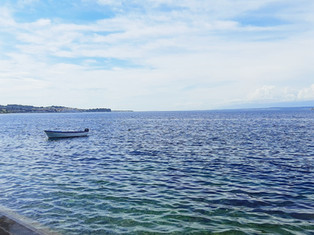Moćun - a tradition of drying and salting fish
- Vedran Obućina

- May 30, 2020
- 4 min read
Updated: Oct 21, 2021
The tradition of drying, salting and marinating fish is slowly disappearing on many Croatian islands. In Kali, on the island of Ugljan, this culinary custom returns as an original island product. As Nina Mrkonja writes: “Since the beginning of fishing in Kali, fish processing by salting has been a hidden source of income for most Kali families. Earlier, they extracted salt from the sea themselves, and the main reason was unfavourable prices and disconnection from the mainland." Small family business Moćun, which in the Kali dialect means anchovy, is run by Marko Kolega and his wife. In the last ten years, they have specialized in this way of preparing and storing fish, although he is not the first to start doing it. Before him, Livio Perin returned to the old customs with his fishing and processing company Šiš-mar.

Kolegas are now one of the few Kaljani who have a product like this, which enchants with its presentation and even more with its taste. Along with them, there are Šiš-mar and Čedo Školjarev, and on the mainland, in Poličnik near Zadar, the company Mišlov has its manufactory for salting and marinating fish. We ask Marko where his ideas come from, and he says: “As it was done 300 years ago, so it is now. Seafood flavours are cultivated throughout this time. Until 2008, I was also a fisherman, and then I dedicated myself to fish processing. I still fish today, when I have time, both for business and pleasure. "

Not so long ago, when there was no refrigerator or freezer, the fish was salted or dried. Those who are aware of the great taste of dried fish still dry fish on balconies and in yards today, and most often they are hake, small shark, catshark, skate. In front of us is a pile of dried shark and catshark. Marko says how the fish is dried: “The skin is peeled, filleted and dried into the final product and dried for a year in the air. Dried fish is cooked, put in brodetto or grilled. ”Skate is also dried here, and Marko shows us frozen tuna and shrimp tails in freezers. Kaljani say about dried fish: "it cannot be found in any brodetto but ours". By the way, Kali brodetto is special because it is prepared with potatoes and most often from the angler.

A special treat is salted fish, and we were in Kali just at the time of salting, which lasts from May to August. Lockard and, of course, sardines are salted in Moćun. Everyone knows the procedure: first a row of salt, then a layer of sardines, stacked heads - tail. Then a layer of salt, followed by sardines perpendicular to the previous layer. Sardines are among the most popular fish in the Adriatic. A rich source of Omega 3 fatty acids, sardines are often associated with the Mediterranean island of Sardinia, around which fishermen have come across large shoals of this great fish. Sardines have fed generations of islanders, so they call her the uncrowned queen of the sea. In traditional menus, sardines were indispensable, both on the tables of the poor and on the tables of foodies who added salted sardines to dishes instead of salt.

Venetian provveditore and Italian travellers who had the gift to record the smells and tastes of the Croatian Adriatic wrote about the large quantities of salted fish in Dalmatia. According to these records, and there are many of them, the islands of northern and central Dalmatia are just as famous and important for sardine fishing and salting as Sardinia, Corsica and southern France. In the Moćun trade, you will not find cans of sardines, as this fish is most often known to Europeans, but in pleasant jars where the taste is hidden, which will surprise many. In comparison to many, even industrial, salting habits, Kali salted sardines have the right ratio of salt and fish, so you can feel both the salinity and the texture of the fish meat. So it is with other products, and we tried red peppers stuffed with fish, where none of the ingredients takes away most of the flavour, and the fresh tuna pate is simply fantastic!

We are thinking, Croats must be crazy about this product! Unfortunately, this is not the case: "Almost everything is exported. Our caterers rarely use these products. Only the people of Dubrovnik and a certain part of Zagreb buy from me. It is mostly exported to Italy but through intermediaries. We do not have enough power to present the Croatian product at the European level, so we export the so-called semi-finished products which are then exhibited as Italian, Spanish and the like. Gastronomy packing is intended for hotels and restaurants.”Thus, the epic about sardines ends in inconspicuous corners of local fish markets, while the general notion of this important fish is placed in a metal sarcophagus canned in stores.

Marinated fish is also a valued product from the Moćun business. Marko marinates anchovies, tuna, octopuses, and shrimps, as well as salted anchovies and anchovies with Pag cheese. We tasted it all in a pleasant conversation over a glass or two of homemade island wine. The fish is dipped in extra virgin olive oil from Ugljan, which some say derives its name from Uljan, or the island of oil. This combination is a winning hit for every seafood lover, and you can order them directly from Marko Kolega himself:
Obrt Moćun
Obala kaljskih ribara i pomoraca 26, 23272 Kali
markokolega78@gmail.com
+385 98 81 34 07 | Marko Kolega
Photos: Josip Paškov
























Comments